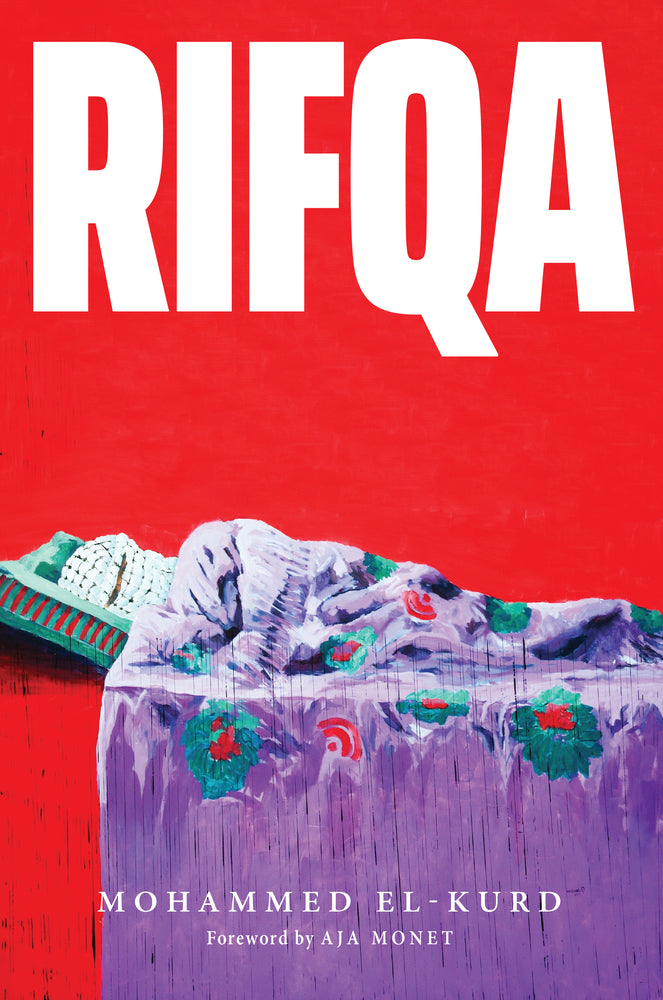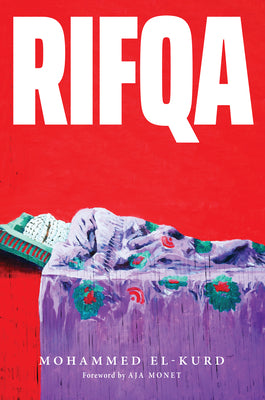Description
Description
Rifqa is Palestinian poet Mohammed El-Kurd's ode to his late grandmother, and to the Palestinian struggle for liberation. 'Jerusalem is ours.'
About the Author
About the Author
Mohammed El-Kurd is an internationally-touring poet and writer from Jerusalem, Palestine. His work has been featured in The Guardian, The Nation, This Week In Palestine, Al-Jazeera English, and the forthcoming Vacuuming Away Fire anthology, among others. Mohammed graduated from the Savannah College of Art and Design with a B.F.A. in Writing, where he created Radical Blankets, an award-winning multimedia poetry magazine. He is currently pursuing an M.F.A. in Poetry from Brooklyn College. His poetry-oud album, Bellydancing On Wounds, was released in collaboration with Palestinian musical artist Clarissa Bitar. Apart from poetry and writing, el-Kurd is a visual artist, printmaker, and most recently, co-designer of a fashion collection with Serbian designer Tina Gancev. Mohammed has spent his undergraduate weekends performing poetry at campuses and cultural centers across the United States and hopes to continue in the post-COVID-19 era.
Critical Reviews
Critical Reviews
"May these poems challenge and awaken you. May they shake you into action. May they help you find the words for what you already know to be true... These words remind me that home is a series of shared memories, not brick and mortar. Home is where we go to remember and revisit who we've always been. Mohammed El-Kurd's poetry is a home returned to us."
-aja monet, from the foreword
"Rooted in Palestine and ranging across the world, these are poems that hurl themselves at the boundaries of what poems can do; lyrics that put a premium on anger, that reflect the serrated edges of living in the world today, that gift new and powerful phrases to the lexicon of liberation."
--Ahdaf Soueif, author of Cairo: My City, Our Revolution
"Rifqa is an absolute marvel, and El-Kurd
is precisely the kind of poet-- Palestinian or otherwise--we need right now:
unafraid of the truth. The legacy of his grandmother, the eponymous Rifqa,
flits across these poems, and with it comes wisdom, hope, and, most crucially
of all, memory ... El-Kurd doesn't flinch from the violence and death that comes
with dispossession. But make no mistake. These are the poems of the defiantly,
unapologetically, wholly alive."
"Rifqa is an admixture of the most
intimate violence--wounds that are as difficult to reveal as they are to
heal--together with song and dance that beseech the sun to sustain this life and
these lands that ensure it. Rifqa El-Kurd lives in Mohammed and Mohammed
breathes life into us, scented with fire and jasmine flowers, so that we may
know her, and the victory she embodied, too." --Noura Erekat, author, Justice for Some: Law and the Question of
Palestine
"Rifqa is the collision of strength
and vulnerability. Earnest in its exploration of the grave realities in one
corner of the globe, it is a banging on the doors of the world. It illustrates
the wit that is necessary to weave together the tragic with the hopeful and the
painful with the joyful. Rifqa is a testament to overcoming fear in expression,
a book that will resonate with you, one you hold and return to over and over
again." --Mariam Barghouti, journalist,
researcher, activist, and commentator "Palestinians have long fought with poetry. Napoleon's army in Palestine was
defeated by warrior poets. El-Kurd's words are part of this long and dazzling
lineage. An elegy to our ancestors, maternal, whose resistance we hope to
honor, each poem is a rock hurled at the occupier and the oppressor. A
beautiful and important book." --Randa Jarrar, author, Love Is an Ex-Country
"Mohammed El-Kurd weaves the ancestors and Land into every breath of these
poems. 'Every grandmother is a Jerusalem, ' El-Kurd reminds us, in
jasmine-scented memory, in liminal space and punch line, in auto- and
anti-biography. Here is poetry the whole of us can turn and return to--even in
grief, even in contradiction. Liberating itself from respectability & other
colonialist gazes weaponized against Palestinians, here is poetry insistent on
truths we've carried for generations. JERUSALEM IS OURS. El-Kurd writes this
with its whole chest, knowing our lives--the whole & future of us--depend on
it. --George Abraham, author, Birthright
"El-Kurd's poems are attuned to language as a terrain of struggle.
Refusing the myriad euphemisms that conceal and authorize Israel
Publishing Information
Publishing Information


The Allstora Membership
Membership Perks:
- Save 30% on all online store purchases
- Exclusive access to author's content
- You pay less, but authors still earn double
Membership Terms:
- To access membership discount simply log in and add to cart, discount applied automatically.
- One month free trial, cancel anytime. Membership renews on the 15th of each month.



